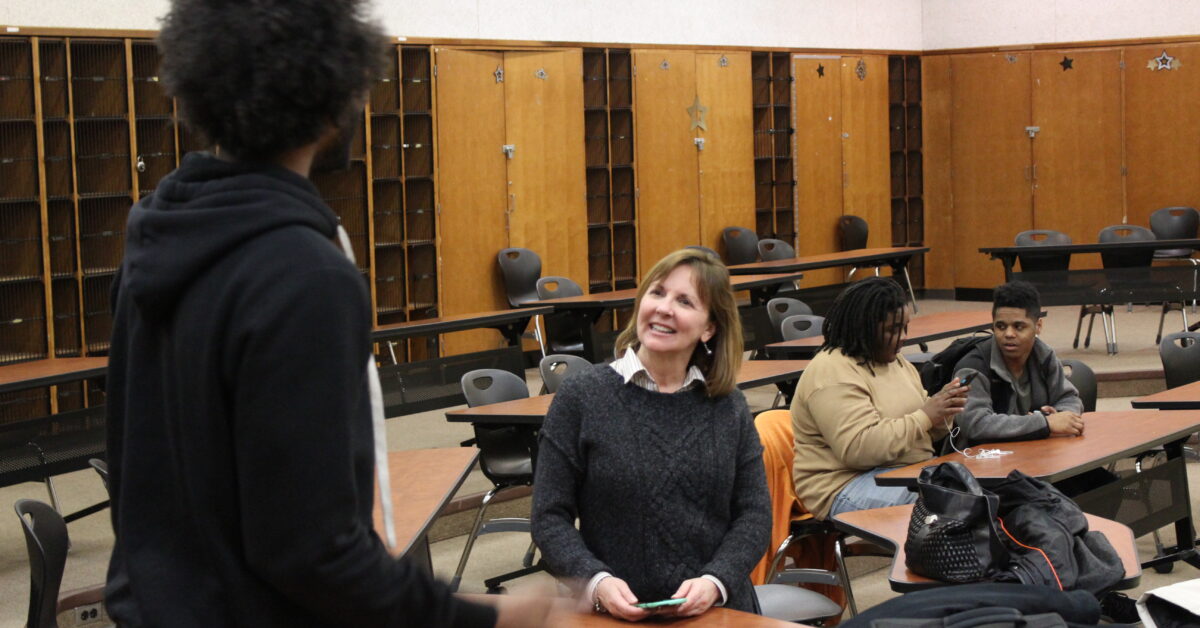Financial literacy as a component of community justice
April 10, 2017

by Brenda Campbell, President and CEO, Make A Difference – Wisconsin
“The opposite of poverty is not wealth. In too many places, the opposite of poverty is justice.” – Bryan Stevenson
This quote from Stevenson, a lawyer, author, social justice activist and more, keeps popping up in my head. As a financial education organization, we deal with poverty. There’s no way around it. As April is Financial Literacy Month, it’s important to tie together the ways financial empowerment connects with equity and justice in our communities.
Our business community volunteers share personal finance information with teenagers of all socioeconomic backgrounds. (Like volunteer Money Coach Laura Berry, pictured at left, talking about banks with Washington H.S. of I.T. junior, Kenique.) But the concerns and conversations that happen in the suburbs or rural schools can be much different than those in our cities, where teens face some of the most drastic hardships. How can you hold a student’s attention on bank accounts when that student might be unsure about where her next meal is coming from, or where he is going to sleep tonight. And why open an account when you have no money?
I don’t pretend to think that financial education courses are going to solve all of the challenges for those students with the greatest needs. But I can verify, through our years of surveys and studies, that empowering teens with this information leads to behavioral change, and I hope and believe this could be lifelong behavioral change. It might not change all at once and it probably won’t be easy. As part of the wider challenge in uplifting youth, there are two distinct features of financial literacy that translate to deeper transformations of justice over poverty in our community.
Possibility – One thing poverty can rob a person of is hope. With every one of our lessons, we instill in students the idea that they can take these early steps toward financial freedom. For the teens we work with, that good first step often comes in the form of opening a savings account. Some adults find it easy to diminish this action. But if you’re like many of the inner city students we work with who have never had a bank account, never stepped foot into a bank, or even felt like you didn’t belong in a bank, this is important. Many of these teens are in “bank deserts,” a disturbing term a colleague in Chicago shared with me recently, left with check cashing stores to cash their paychecks and nothing when it comes to saving. There is power in holding on to your own hard-earned money, however small that amount may seem at the start.
Proximity – To lead our programs, we train compassionate and dedicated volunteers from all ranges of local business. These volunteers meet with students at their schools or community sites. In addition to the lessons, the proximity of volunteers in the classroom give students an outside perspective from someone who cares. It can often be someone in an industry that they’d want to pursue after graduation or college, though they may not have an accountant, attorney or IT manager in their life whom they can talk to. On the flip side, our approach brings many volunteers into parts of a city they have only heard about through the lens of poverty or crime, like Milwaukee’s Sherman Park neighborhood or 53206 ZIP code. Commonality is realized and empathy happens when people come together. The business leaders we work with are quick to see the ripple effect from connecting with a student ripple outward to smarter families, neighborhoods and communities. This is true whether they’re a single volunteer or members of a group like the African American Employee Resource Group at Northwestern Mutual, the Milwaukee Urban League or the Hispanic Chamber of Commerce, to name a few.
You have to start somewhere. Too often in our country, we’re missing those initial paths to empowerment, where young people don’t just move away from a lack of money, but move toward their own equitable future. I ask that we use this annual reminder of Financial Literacy Month to recognize the potential for all of our youth to rise above poverty and toward pioneering their own financial futures.
